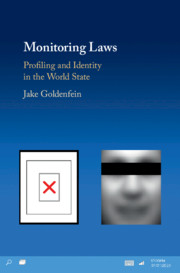Book contents
- Monitoring Laws
- Monitoring Laws
- Copyright page
- Contents
- Acknowledgements
- 1 Monitoring Laws
- 2 The Image and Institutional Identity
- 3 Images and Biometrics – Privacy and Stigmatisation
- 4 Dossiers, Behavioural Data, and Secret Speculation
- 5 Data Subject Rights and the Importance of Access
- 6 Automation, Actuarial Identity, and Law Enforcement Informatics
- 7 Algorithmic Accountability and the Statistical Legal Subject
- 8 From Photographic Image to Computer Vision
- 9 Person, Place, and Contest in the World State
- 10 Law and Legal Automation in the World State
- Index
9 - Person, Place, and Contest in the World State
Published online by Cambridge University Press: 08 November 2019
- Monitoring Laws
- Monitoring Laws
- Copyright page
- Contents
- Acknowledgements
- 1 Monitoring Laws
- 2 The Image and Institutional Identity
- 3 Images and Biometrics – Privacy and Stigmatisation
- 4 Dossiers, Behavioural Data, and Secret Speculation
- 5 Data Subject Rights and the Importance of Access
- 6 Automation, Actuarial Identity, and Law Enforcement Informatics
- 7 Algorithmic Accountability and the Statistical Legal Subject
- 8 From Photographic Image to Computer Vision
- 9 Person, Place, and Contest in the World State
- 10 Law and Legal Automation in the World State
- Index
Summary
There is an emerging body of legal thought directed at contemporary profiling and data science. Some of this focuses on limiting ‘human computability’, some addresses questions of ‘manipulation’ and ‘behavioural optimisation’, and some suggests ways to introduce friction into the information environment to interrupt the translation of data into meaning. This chapter looks at how some of these ideas might be implemented as computational legal applications. It argues that the legal subject of algorithmic accountability can be expanded into a rights-bearing entity that can actively contest how it is computationally interpreted, through mechanisms of ‘contestation by design’. The chapter also describes the utility of concepts like ‘context’ for building boundaries and friction into information architectures, not simply in terms of information flow but also for constraining how the design of those architectures influences and structures behaviour. Finally, it suggests the shape of a new ‘composite’ legal person as a mechanism to constrain profiling behavior by producing an identity as an interface to the ‘world state’ it inhabits.
Keywords
- Type
- Chapter
- Information
- Monitoring LawsProfiling and Identity in the World State, pp. 158 - 177Publisher: Cambridge University PressPrint publication year: 2019



